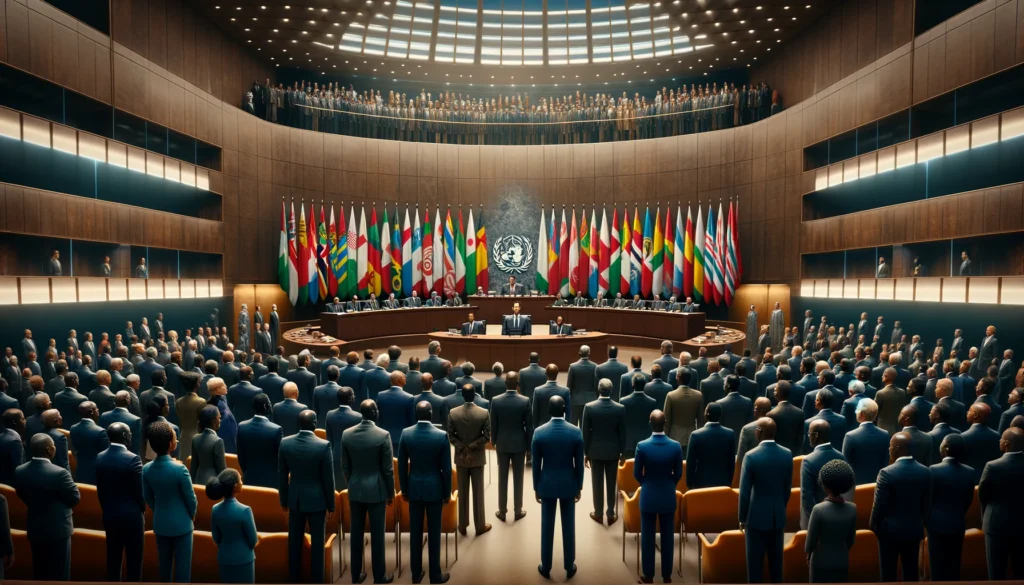
Global Voices Rise Against Israeli Occupation: ICJ Hearings and South Africa’s Genocide Case Unveiled
By Darius Spearman (africanelements)
Support African Elements at patreon.com/africanelements and hear recent news in a single playlist, plus get early access to ad-free video content.
ICJ Hearing: Global Condemnation of Israeli Occupation in Palestine
Over 50 countries have come together to participate in the International Court of Justice (ICJ) hearing regarding Israel’s long-standing occupation of Palestinian territories. This event marks the largest gathering in the World Court’s history, underscoring the global concern and interest in resolving this enduring conflict (SOURCE: More Than 50 Countries Argue Before World Court Against Israeli Occupation of Palestine).
Furthermore, this unprecedented participation highlights the international community’s commitment to seeking justice and accountability through legal channels. It also emphasizes the significance of the issue, which not only affects the Israeli-Palestinian relations but also has broader implications for peace and stability in the region.
Background: The Persistent Israeli Occupation and International Law Violations
Since 1967, Israel has maintained its occupation over the West Bank, East Jerusalem, and Gaza. This action defies international law and denies Palestinians their basic rights, perpetuating a cycle of violence and instability in the region (SOURCE: African Countries Join a United Front Against Israeli Occupation).
Moreover, the occupation has led to numerous human rights violations and has severely impacted the daily lives of millions of Palestinians. These actions contribute to the ongoing conflict and hinder efforts toward achieving a lasting peace in the Middle East.
“The genocide underway in Gaza is a result of decades of impunity and inaction.” — Palestinian Foreign Minister Riyad al-Maliki’s opening statement (Source: More Than 50 Countries Argue Before World Court Against Israeli Occupation of Palestine).
African Nations Unite Against Israeli Occupation in Historic ICJ Case
Fifteen African countries and the African Union (AU) are making their voices heard in the current ICJ case. They express strong condemnation of Israel’s occupation and support for Palestinian rights (SOURCE: African Countries Join a United Front Against Israeli Occupation).
“The occupation violates international humanitarian law and constitutes apartheid…We call for an end to the occupation and a just settlement based on international law and UN resolutions.” — Statement from African Countries’ United Front in the proceedings at the ICJ. (SOURCE: African Countries Join a United Front Against Israeli Occupation).
These nations argue that the occupation breaches international humanitarian law and amounts to apartheid. They are calling for an immediate end to the occupation and a just settlement based on international law and UN resolutions.
Spotlight on South Africa: Accusing Israel of Genocide in Gaza
South Africa has stepped forward, filing a separate case at the ICJ. They accuse Israel of committing genocide in Gaza, a claim backed by several countries including Bolivia, Namibia, and Pakistan (SOURCE: Which countries back South Africa’s genocide case against Israel at ICJ?).
The United States and Israel strongly oppose the case, calling it baseless. They argue that it serves as a distraction from genuine peace efforts (SOURCE: Reaction to South Africa’s UN court case against Israel’s war in Gaza).
Global Reactions: Diverse Responses to South Africa’s Genocide Case Against Israel
The Palestinian Foreign Ministry has welcomed South Africa’s case. They view it as a significant step towards holding Israel accountable for its actions (SOURCE: Reaction to South Africa’s UN court case against Israel’s war in Gaza).
Conversely, the Israeli Foreign Ministry dismisses the case as hypocritical. They argue that it’s based on false claims (SOURCE: Reaction to South Africa’s UN court case against Israel’s war in Gaza). The United States echoes this sentiment, suggesting that the case detracts from peace efforts.
Conclusion: African Leadership and the Quest for Justice in Palestine
The ICJ hearings and South Africa’s genocide case reflect growing international condemnation of Israel’s occupation. This significant participation by African countries underscores their leadership role in advocating for an end to the occupation and a just settlement of the conflict (SOURCE: African Countries Join a United Front Against Israeli Occupation).
The outcomes of these cases could profoundly impact the Israeli-Palestinian conflict and the broader Middle East. They highlight the importance of international law and the global community’s role in seeking justice and peace.
About the author:
Darius Spearman is a professor of Black Studies at San Diego City College, where he has been pursuing his love of teaching since 2007. He is the author of several books, including Between The Color Lines: A History of African Americans on the California Frontier Through 1890. You can visit Darius online at africanelements.org.
